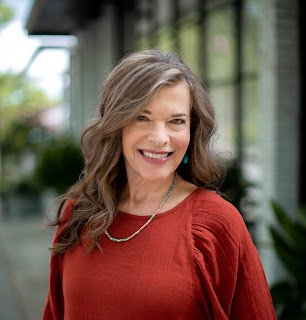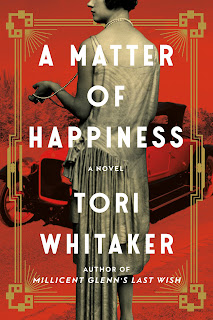Tori Whitaker is the author of the new novel A Matter of Happiness. She also has written the novel Millicent Glenn's Last Wish. She was chief marketing officer for a law firm, and she lives near Atlanta, Georgia.
Q: What inspired you to write A Matter of Happiness, and how did you create your characters Melanie and Violet?
A: My semi-retired husband customizes vintage car interiors—like 1934 Fords and such—and I long knew I’d like to explore the idea of someone finding a meaningful object in an old car stuck in storage.
When I discovered that the Jordan cars were so iconic with 1920s flappers that F. Scott Fitzgerald named a character after the car in The Great Gatsby (Jordan Baker), I knew I’d found my car. The advertising alone for the automobile was way ahead of its time in marketing to the new independent woman, too.
Violet’s character was born out of further research into how a flapper evolved from a young girl in the early 1900s on. She was so much fun to write.
Of course, Prohibition affected a lot in the period and it came to me to juxtapose that era with the modern-day cocktail culture. My husband and I had traveled along Kentucky’s Bourbon Trail a decade back, and I placed 28-year-old rising star Melanie in a growing whiskey distillery.
Q: How was the novel's title chosen, and what does it signify for you?
A: I must’ve considered 40 titles over the course of writing this novel, before my editors and I landed on this one and thought, “This is it!”
That’s because as the book evolved it became more than about Distillery Girls (my original working title) and was really about two fiercely independent women a hundred years apart who were remembering their values, discovering themselves, and learning what happiness in their lives really means.
Q: How did you research Prohibition-era Detroit, and did you learn anything that especially surprised you?
A: I live near Atlanta now, and most of my research took place during COVID when travel was prohibitive. But my husband and I had lived in Michigan for 10 years, and we both worked in Detroit—him in the automotive industry. So I identified with many of the places that appear in the story, from historic Woodward Avenue to Grosse Point to Belle Isle.
What really surprised me though as I studied loads of texts and online historical sources was Detroit’s role in Prohibition. Michigan had statewide Prohibition before the national 18th Amendment, and so bootleggers were ahead of the game.
And the narrow Detroit River that separates the state from Canada was key. Canada could still produce booze legally, and rumrunners were notorious for bringing liquor back to Detroit by boat, and then a criminal network distributed it across the country.
This feature serves as a backdrop in my book—none of my characters are rumrunners. But federal agents couldn’t keep up with controlling the booze pouring in, and speakeasies and blind pigs were everywhere.
Q: Did you know how the novel would end before you started writing it, or did you make many changes along the way?
A: I’d written the last chapter and epilogue by about half way through the first draft, so I knew the main ending for Melanie’s modern storyline (though there was one instance regarding her ex-fiancé that was subsequently modified).
Violet’s story in the historical thread had many more changes over time. For instance, beginning drafts had her mother passing away early on, but I’m so glad I kept her alive. Her character plays an important part in Violet’s life.
Q: What are you working on now?
A: I’m deep into research so it’s too early to tell! I feel certain there will be a past-and-present component though, and maybe it’ll include at least one setting that’s a bit newer to readers.
Q: Anything else we should know?
A: I’ve been told that readers need not be bourbon connoisseurs or even old car
buffs to appreciate the story—similar to how it’s fine to have no previous
knowledge of 1700s herbal remedies to enjoy Sarah Penner’s The Lost Apothecary.
The core of the dual timeline story here is the two women a century apart, and their stories parallel each other’s lives in unexpected ways until the final intersecting conclusion.
--Interview with Deborah Kalb. Here's a previous Q&A with Tori Whitaker.


No comments:
Post a Comment